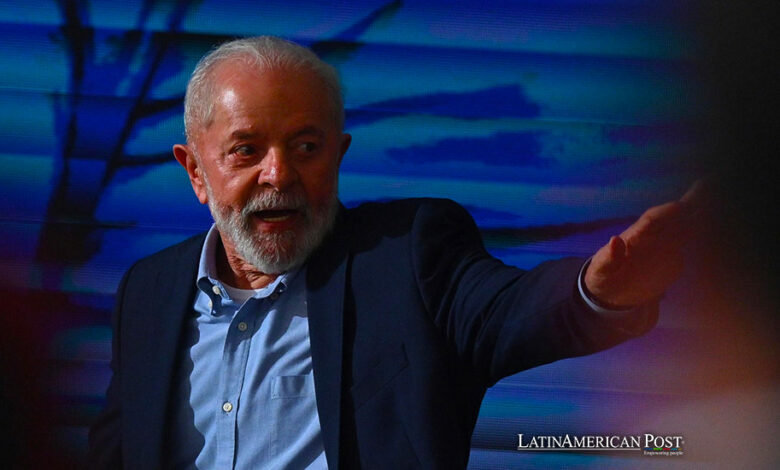Lula Introduces Agrarian Reform Plan to Strengthen Family Agriculture in Brazil

President Lula unveils a transformative agrarian reform plan, aiming to distribute land and empower Brazil’s family farmers, fostering not just social justice but also a promising avenue for economic growth across rural communities.
In Brazil’s sprawling landscapes, where the horizons stretch as far as the eye can see, a new dawn breaks for thousands of landless farmers. President Luiz Inácio Lula da Silva’s administration’s announcement of a return to progressive agrarian reform signals not just a political shift but a renewed promise to the rural heart of Latin America’s largest nation.
Addressing Brazil’s Age-Old Issue
The policy reinstates a core initiative that has long been a contentious issue in Brazil’s socio-political tapestry. “It’s an age-old problem in Brazil,” declared President Lula, articulating a vision to work alongside governors and mayors to “identify lands available for new settlements” so that “people can have at least two or three hectares to produce their food.”
The unveiled program aims to grant land to approximately 295,000 landless peasant families within two years. These lands will include public and private territories left idle by their owners, a resourceful repurposing of unused land that reflects the government’s strategic planning. This initiative, if successful, could lead to a significant increase in food production, reducing the country’s reliance on imports and enhancing food security. It could also stimulate economic growth in rural areas, creating jobs and boosting local economies.
This initiative is not only about providing land but also about ensuring sustainability and productivity. The farmers will receive public credits at preferential rates to buy machinery and seeds. Moreover, the government will partly purchase its produce from family agriculture to fulfill its food plans for schools, hospitals, prisons, and other public institutions.
Empowering Family Agriculture
Family agriculture accounts for about 30% of Brazil’s total food production, which is no small feat for a country recognized as an agricultural powerhouse on the global stage. The new policies stand to bolster this sector, offering a backbone to the nation’s food security and an economic lifeline to its rural inhabitants.
The contrast between Lula’s approach and that of his predecessor, the far-right Jair Bolsonaro, is stark. From 2019 to 2022, Bolsonaro’s administration halted new settlements and limited agrarian reform to the distribution of property titles to peasants already in possession of land.
Brazil’s agrarian reform has been a lingering issue for the uninitiated, with land distribution inequalities tracing back centuries. Large tracts of arable land are owned by a small fraction of the population, a relic of colonial legacies and subsequent historical factors. The landless workers’ movement, Movimento dos Trabalhadores Rurais Sem Terra (MST), has been at the forefront of advocating for land redistribution. They see it as a fundamental right and a necessary step towards social justice and economic equality, often organizing protests and occupations to draw attention to the issue.
A Pivot Towards Social Justice
The current administration’s move can be seen as a pivot toward these social movements as much as an economic strategy. The land reform can potentially reduce rural poverty, and most importantly, improve food sovereignty, offering a sense of security about the nation’s food supply and empowering local economies, particularly in Brazil’s neglected interior regions.
But Brazil is not the only One that stands to benefit. Across Latin America, similar narratives play out—vast lands and immense agricultural potential, yet plagued by inequality and underutilization. Brazil could set a precedent for its neighbors by taking the lead, igniting a more significant, continent-wide transformation.
This new chapter of agrarian reform also dovetails with contemporary global concerns about sustainable farming practices and climate change. As small-scale farmers tend to use land more sustainably, the program aligns with environmental goals, potentially reducing deforestation and preserving biodiversity, issues that are particularly resonant in the context of the Amazon rainforest and other vital ecosystems in Brazil. By encouraging small-scale, diversified farming, the initiative could help reduce the reliance on monoculture, a practice often associated with deforestation and soil degradation.
Yet, the success of such an ambitious initiative is contingent upon its execution. It requires robust collaboration between federal, state, and municipal governments, and most importantly, the active support and participation of the public and civil society, who play a crucial role in overcoming resistance from powerful agribusiness interests that have traditionally influenced land policies.
The commitment to purchase produce from these farmers is also critical. It not only provides a direct market but also encourages crop diversification, which could lead to a healthier diet for the population. This is particularly important in a country like Brazil, where dietary patterns have shifted towards processed foods, contributing to rising rates of obesity and related health issues.
By integrating these farms into the broader economic system, Lula’s government could help stabilize the agricultural market, safeguarding against volatility in international commodity prices that often hit small farmers the hardest.
Focusing on preferential credit lines for acquiring seeds and machinery can also be a game-changer. The government will offer low-interest loans specifically for these purposes, making it easier for small farmers to invest in their operations. This can level the playing field for small farmers competing against agribusiness giants, enabling them to enhance productivity and foster innovation.
A Human-Centered Approach
However, the human element remains the heart of the program. It’s about giving people — often the most marginalized in Brazilian society — the means to self-sufficiency, dignity, and a stake in their nation’s future. For families who have known the hardship of landlessness, the government’s programs could mean a transformative journey from vulnerability to security, hunger to nourishment, from the margins to the center of Brazil’s agricultural narrative.
The road ahead is lined with both opportunity and challenge. If fully realized, these programs could have a profound impact—reshaping not just the countryside but the very fabric of Brazilian society and offering a blueprint for a more equitable and sustainable model of rural development.
Also read: IATA Challenges Brazil on High Jet Fuel Costs, Seeks Change
In the words of Lula, these reforms represent more than economic policy; they embody a moral commitment to the Brazilian people. As this initiative unfolds, the world watches with bated breath, hopeful that this step may herald a brighter future for the countless rural families poised to transform their lives through the dignified work of farming their land.





